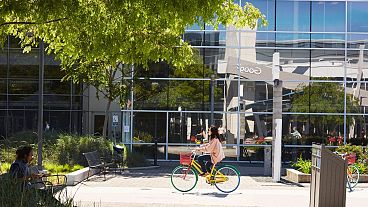Global investment bank Goldman Sachs sees private markets as likely to outperform in 2024.
US equity and private markets could potentially do well this year, but commodities are best to avoid due to their volatile nature, a senior executive at global investment bank Goldman Sachs has said.
"We are positive but cautious. We see the best returns in US equities, we are very positive about private markets [ed: investing in non-publicly traded companies]," Stefan Bollinger, co-head of EMEA at Goldman Sachs, told Euronews Business at the World Economic Forum (WEF) in Davos on Thursday.
"And I would say we are a little bit more worried about inflation and the outlook for central bank policy than maybe some other people," he added.
The US and UK economies have shown a lot more resistance than expected in the second half of 2023, paired with lower-than-expected inflation. Stock markets have therefore seen a lot of buyers, and hopes that central banks would lower key rates in the first half of 2024 significantly boosted equity markets at the end of the year.
The ultimate investment approach
"Stay invested".
That's Bollinger's number one rule that he recommends to Goldman's clients, even when the economic chips are down. He pointed a finger at 2023, when the US equity market rose more than 25% despite the concerning economic results from across the globe, with high inflation and elevated borrowing costs limiting investments in various sectors.
"It's just very hard to say when the good years are, and when the bad years are," said Bollinger. "If you look at the last 20 years and if you think about which were the best years, for example, for private equity; it was exactly those years where you wouldn't have invested: 2008-2009 were great vintages."
"And we think the market has more to go, particularly in the US," he added.
The appetite for investments in generative AI
The real question to answer before deciding if AI-related shares are overpriced or not is to see when and how the technology can transform productivity and what it yields.
Goldman Sachs said in an earlier published report that generative AI could raise global GDP by 7%.
"We put out a research piece that says over the next 10 years, we'll see productivity gains of 1.5%, which translate into annual GDP growth of 7%," Bollinger explained, adding that the US economy had seen an annual growth of around 2% in the past 20 years.
The question is just how long it's going to take. As to when it is worth investing, looking at the past success stories in the tech sector, Bollinger said that often "it's not the early adopters, but it's someone else that ultimately comes out as the winner."
ESG takes a back seat while commodities shake-up
Due to the many geopolitical uncertainties, commodity markets have been extremely volatile, and therefore Goldman Sachs is not eyeing it as an investment opportunity.
Nevertheless, it needs to remain on the radar as part of investors' "tactical view", according to Bollinger.
The risk of a price shock is admittedly much lower than at the dawn of Russia's war against Ukraine, as energy security is taking the main stage.
Parallel to that, environmental, social, and corporate governance (ESG) has been taking a bit of a backstage, Bollinger noted, after companies started considering it a main focus in recent years.
"While ESG has maybe moved a little bit lower in the priority of some investors, I actually think now it's done the right way because now everyone has a commercial focus," he said. "Everyone wants to do something that has real impact, rather than some of the things that were done, that were, really not addressing the problem."
Disclaimer: This information does not constitute financial advice, always do your own research on top to ensure it's right for your specific circumstances. Also remember, we are a journalistic website and aim to provide the best guides, tips and advice from experts. If you rely on the information on this page, then you do so entirely at your own risk.



